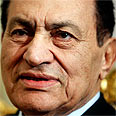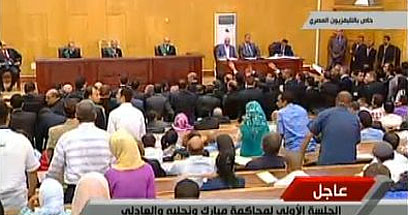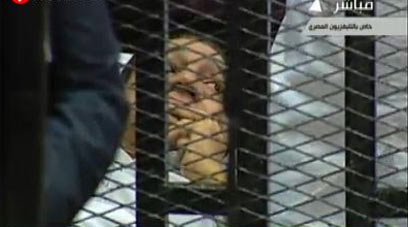
Hosni Mubarak goes on trial
Deposed Egyptian president to face charges of abuse of power, conspiracy and corruption, may face death penalty if convicted. Mubarak, sons deny charges
Case No. 3642 – The Arab Republic of Egypt vs Hosni Mubarak: Ousted Egyptian President Hosni Mubarak will become the first Arab leader to be tried in wake of the Arab spring, as he faces the Cairo court Wednesday.
Mubarak faces multiple charges of conspiracy for his role in killing pro-democracy protesters, as well as abuse of power and corruption charges. Wednesday has already been dubbed a historical day in Egypt's history, as Mubarak's trial is unprecedented and is likely to rattle Arab rulers facing unrest across the Middle East.
- Receive Ynetnews updates directly to your desktop
Mubarak has been hospitalized in the Red Sea resort of Sharm el-Sheikh since April. The ailing 83-year-old left the hospital for Cairo on Wednesday morning via a medically equipped aircraft. He was reportedly accompanied by members of his family.
Many Egyptians view Mubarak's illness as a ploy so ruling generals can avoid publicly humiliating the war veteran and ex-president who ran Egypt, the Arab world's most populous nation, for 30 years until he was driven out on February 11.
In Cairo, the court, with a cage for defendants, has been set up at the Police Academy, with a screen erected outside the building to show the trial.
Unlike Tunisian President Zine al-Abidine Ben Ali, the first Arab leader to be ousted in the Arab Spring and who fled to Saudi Arabia, Mubarak has vowed to die on Egyptian soil.

The Egyptian courthouse (Photo: Egyptian TV)
Also standing trial are Mubarak's two sons Gamal, a banker-turned-politician once seen as being groomed for top office, and Alaa, who had business interests. Alongside them will be former Interior Minister Habib al-Adli, one of the most reviled members of Mubarak's cabinet, and six senior officers.
Business executive and Mubarak confidant, Hussein Salem, is being tried in absentia. Charges range from conspiring in the killing of protesters to abusing power to amass wealth.
Mubarak has denied the charges against him, saying "I entirely deny all those accusations." His two sons, Gamal and Alaa, both holding copies of the Muslim holy book the Koran, also denied charges.
Riots broke out outside the police academy courtroom as Mubarak's sons arrived, as the former president's supporters clashed with security forces.
"We will demolish and burn the prison if they convict Mubarak," they screamed at hundreds of police and army troops backed by armored personnel carriers.

Mubarak in the courtroom cage (Screenshot: Egyptian TV)
Egypt's state television showed images of Hosni Mubarak's ambulance drawing up to the court building. Crowds of security and other people surrounded the vehicle immediately. The former President was carried into the courtroom on a gurney, accompanied by a medical team.
The trial will also be the first time Mubarak and his sons see each other since late April.
'Revolution standing trial'
"This is undoubtedly a historic event, by both Egyptian standards and the Arab world at large," Professor Yoram Meital from Ben-Gurion University told Ynet.
"I don't think this will turn out to be a spectacle trial," he added, "We need to remember that the last time an Arab leader was tried, it was a brutal spectacle trial – and the result was the execution of Saddam Hussein. That trial was held with the backing of the Americans.
"This is a different kind of trial. There was a civil uprising in Egypt, and so the revolution is also standing trial in the sense of seeing what will come of it in the future," he said.
Prof. Meital stressed that Egypt does not want to repeat Saddam Hussein's trial, which was held behind closed doors. "This trial will be very quick. I believe it will last only a few days or weeks, not longer than that," he said.

Gamal (left) and Alaa, in the defendants' cage. (Screenshot: Egyptian TV)
Asked about Mubarak's possible punishment, Prof. Meital said he will be surprised if the former Egyptian leader is given the death penalty. "Legally and constitutionally, even if there's a death sentence, it does not guarantee that it will be carried out," he noted.
Professor Itamar Rabinovitch from Tel Aviv University added that "Mubarak undoubtedly made mistakes, and stayed in power far too long. There will always be a problem – especially in totalitarian regimes – of knowing when and how to step down in dignity.
"That being said, Mubarak did stir Egypt out of a difficult situation after the assassination of Saadat, and issued reforms during his last years in power. To see a man of his stature being humiliated in such a way is a difficult sight," he said.
Former Ambassador to Egypt Zvi Mazel ventured that Mubarak relatively close ties to Israel would also play a part in his trial.
"It's highly likely that the subject will come up," he said. "Many of the (anti-Mubarak) protesters have their hatred of Israel in common, and with Mubarak charged with selling gas to Israel for a price cheaper that market value, that's bound to come up."
Mazel further dismissed what has come to be called the "gas conspiracy," at "first-class nonsense."
The former ambassador said he was saddened to see a humiliated Mubarak wheeled into the specially-built cage in the courtroom. "He did so much for Egypt for 30 years… there's room for some compassion. Let him end his days in peace."
If convicted, Mubarak could face the death penalty. In his only public comments since stepping down, he vowed in April to clear his name and that of his family of accusations of corruption.
Elior Levy, Reuters and AP contributed to this report
- Follow Ynetnews on Facebook










